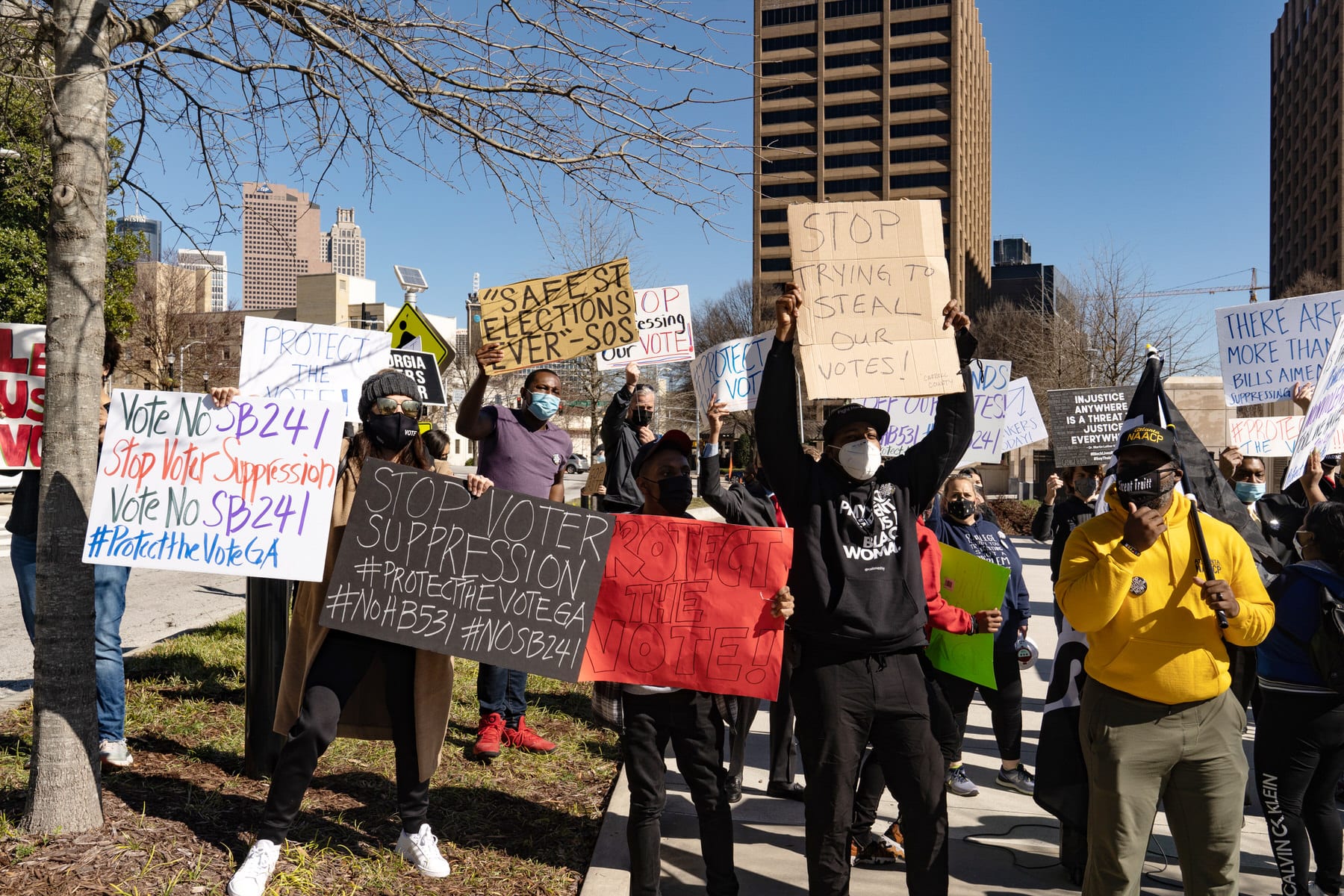In the nearly two months since the Georgia statehouse began its latest session, LaTosha Brown has counted dozens of bills filed that would add voting restrictions: on who can vote by mail and how; on early in-person voting; on convenient absentee ballot dropboxes.
Brown, co-founder of the national get-out-the-vote organization Black Voters Matter, believes the intent of the bills moving through the Republican-controlled legislature is crystal clear: to disenfranchise Black voters who helped elect multiple Democrats statewide in the last election.
“In this country, when Black voters show up, it’s almost like it becomes punitive,” she said. “When we show up in record numbers, there’s always this backlash that has led to restricting the vote. So to be in 2021, and we’re still dealing with this same vicious cycle of racism and anti-democracy principles, it’s just very upsetting.”
This year, state lawmakers have carried over, prefiled or introduced more than 250 bills in 43 states that the Brennan Center for Justice describes as restrictive to voting, but Georgia stands out for the sheer number of proposals: Lawmakers have introduced dozens of bills, effectively making it an epicenter of such legislation.
It’s also become ground zero for voting rights groups, both local and national, to focus their attention on the growing attention on voting restrictions popping up outside of Congress. Several key groups, led by Black women, in recent days have shifted their attention to calling out businesses that could have sway with lawmakers.
Two bills have begun to get the most attention: HB 531, which passed in the state House, would require new forms of ID to vote by mail, shorten the window for requesting and returning an absentee ballot, limit drop boxes, and restrict weekend voting by making counties choose between Saturday or Sunday voting. It would also make it a misdemeanor to give food or drink to anyone waiting in line to vote.
In the state Senate, SB 241 would eliminate “no-excuse” voting, a policy that Republicans in the legislature put in place several election cycles ago that allows voters to vote by mail for any reason. Those who remain eligible, including the elderly, disabled and certain workers, would need a witness signature and photo ID.
“It’s atrocious the way in which they’re handling the situation and trying to roll back the clock,” said Deborah Scott, executive director of Georgia STAND-UP, an Atlanta-based group that works on civic engagement and community issues. “We expected this backlash. We didn’t know it was going to be so egregious, but for every action there’s a reaction.”
Scott believes that Black women, as the backbone of the Democratic Party and leaders in turning out the vote in Georgia, would be disproportionately impacted by voting restrictions.
“Even though it’s a way to suppress Black voters, specifically it will suppress Black women’s vote,” she said.
About 5 million people voted in Georgia in the 2020 election, a record despite the coronavirus pandemic. President Joe Biden won the state with about 12,000 votes more than Donald Trump, the first time in nearly three decades that a Democratic presidential candidate won the state. He was propelled by Black voters, who also overwhelmingly voted for the Democratic candidates who won a new slim control for the party in the U.S. Senate.
The power of Black voters in Georgia has been growing for years. From 2000 to 2018, the share of Black voters in the electorate grew by 5 points, the largest percentage point increase out of any battleground state. The share of White voters dropped 11 points. While Hispanic and Asian American voters represent smaller portions of Georgia’s electorate, according to Pew, they have more than tripled their representation in the same period, signifying their growing political power.
No major voting legislation has yet reached Republican Gov. Brian Kemp, though he has indicated for months that he supports voting restrictions. Kemp has been a frequent target of attacks by Trump, who called for the governor’s resignation late last year for not coming out more strongly against Biden’s win. On a radio program this week, Kemp expressed explicit support for a photo ID on absentee ballots.
“I’ve heard a lot of the complaints from people. I know why folks are frustrated,” the governor told host Hugh Hewitt on Tuesday. “I’ve always had the stance that we need to make it easy to vote, hard to cheat.”
Georgia election officials certified Biden’s win several times, repeatedly proving he won the race. Republicans, led by Trump, have spread conspiracy theories about widespread voter fraud in the 2020 election that no court or audit has turned up. Now Republican lawmakers in Georgia and elsewhere say new voting restrictions are needed to boost public confidence in elections.
Na’ilah Amaru, an advocacy and policy strategist who works on voting issues and served as a legislative aide to former Rep. John Lewis, said the language used about “fair elections” is loaded.
“What does fair elections mean to people who come from well-resourced communities, who control historically power of statehouses, as opposed to what does fair elections mean to communities who have been intentionally excluded from formal modes of power and access to the ballot box?” she said.
Maya Contreras, a New York-based voting advocate whose father and brother live in Georgia, was particularly critical of a proposal that could effectively cut Sunday voting that is popular with Black voters who hold “Souls to the Polls” events that tie voting to church service.
“They’re doing this for the main reason of fear,” Contreras said of Republicans. “They fear that fair elections means they’re going to have to work harder to earn the vote of the general public.”
Voting advocates warn the potential changes could have serious consequences for the 2022 election. U.S. Sen. Raphael Warnock, a Democrat who won the recent runoff along with Sen. Jon Ossoff, will be up for reelection in two years. Organizers in the state are watching to see if Democrat Stacey Abrams, who narrowly lost the governor’s race in 2018 against Kemp, may consider another run.
Brad Raffensperger, the Republican secretary of state, vocally pushed back against accusations of fraud in the last election, and dismissed requests by Trump to “find” ballots, but he has also expressed support for proposals included in several bills.
Raffensperger has expressed support for photo ID in absentee ballots and added that his support for eliminating no-excuse absentee voting is to address concern by some election officials who said it was overwhelming them. A record 1.3 million people in Georgia voted by mail last election.
It’s unclear how these proposals to curb voting will impact other voters. Research by Stanford University released months before the 2020 election based on roughly 20 years of election data showed vote-by-mail does not appear to affect either major party’s turnout. Contreras said Republican efforts show they are willing to lose voters who might support them if they think it ensures Democrats lose elections.
“It won’t just hit Black people, it will hit White people as well. It will hit people who are part of their base,” she said of Republicans. “They’re willing to sacrifice that as long as they can figure out a way to stay in power. That’s really the story.”
Raffensperger’s office declined to make the secretary available for an interview. But he told GPB News that he thinks a photo ID requirement on absentee ballots would add security to mail-in ballots (research shows there is no evidence of widespread fraud in states with universal vote-by-mail systems). He also said people should not put as much emphasis on the previous election cycle since the pandemic impacted voting practices.
“We need to make sure that the General Assembly doesn’t react to the past election, and they really look at ‘How can I secure and give people confidence in the accuracy of the results,'” he said.
Brown, Scott and other voting advocates are finding new ways to oppose the proposed voting restrictions. Some recently launched an ad campaign pressuring major businesses in the state to oppose the bills. The groups have paid for a full-page ad in several newspapers.
Fair Fight Action, a group founded by Abrams, has kicked off a seven-figure ad campaign against the voting bills. New Georgia Project Action Fund will launch billboards this weekend ahead of the NBA All-Star Game, a major basketball tournament in Atlanta that draws national attention to the state’s most populous city.
More Than a Vote, the civic engagement group founded by LeBron James, also plans to launch an ad campaign during the tournament.
Similar public pressure has made a difference on legislative policies elsewhere. In Indiana in 2015, then-Republican Gov. Mike Pence revised an anti-LGBTQ+ “religious freedom” law after businesses threatened to boycott the state. Similar backlash against an anti-transgender “bathroom bill” law in North Carolina in 2016 led the legislature to repeal parts of it.
“The bottom line is that corporations and businesses have a responsibility to actually protect democracy,” Brown said. “This is not a burden for Black people or Black women in particular to bear. There is an expectation that they will stand with us.”
Nicole Henderson, communications director for New Georgia Project Action Fund, said the organization estimates it has sent more than 280,000 texts since Tuesday aimed at stopping voting restrictions at the statehouse, where they’re also coordinating in-person protests.
Henderson said the grassroots organizations are working together to stop the bills “to ensure that access to the ballot is not rolled back to Jim Crow era laws.”
Contreras said she doesn’t know whether any of the bills will pass, but she called the process exhausting and aimed at diluting outrage at any one proposal. She and others have expressed support for H.R. 1, the federal legislation that aims to expand voting rights. The bill’s future is unclear.
“We just want to be able to live our lives, and have a career and have decent food on our table and safe shelter. For them to try to prevent that by preventing us from having a say in our democracy, to me, that is what’s at stake with Georgia right now,” she said. “Our democracy hinges on it. I don’t feel like that’s hyperbole at all.”
Brown said the timing of all the legislation is particularly difficult. Sunday marks the 56th anniversary of Bloody Sunday — the day in 1965 when people attempted to march from Selma to Montgomery to protest racial segregation and were beaten severely. The attention later became the catalyst for then-President Lyndon B. Johnson to sign the Voting Rights Act that prohibited voting discrimination based on race. This year will mark the first anniversary of the event without Lewis, a civil rights icon who was among the marchers.
“Here we are, fighting the same exact issues that we thought we had overcome,” Brown said.






